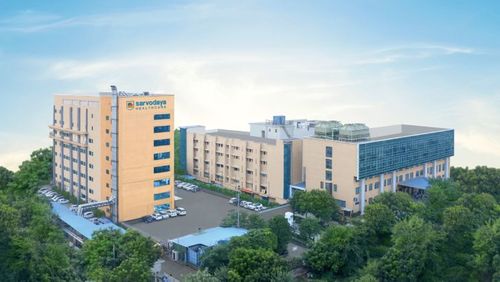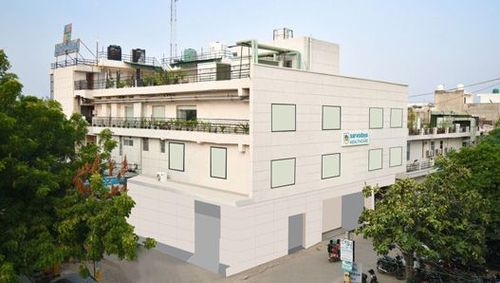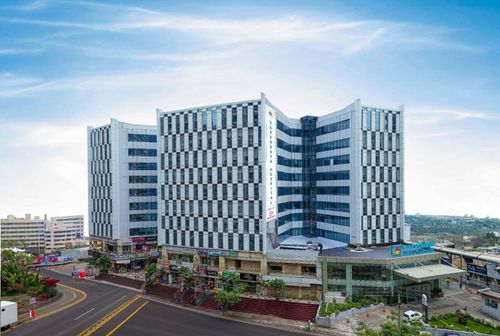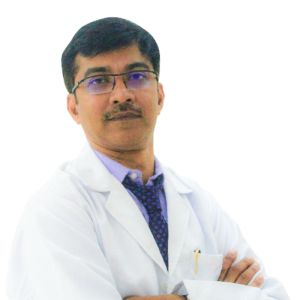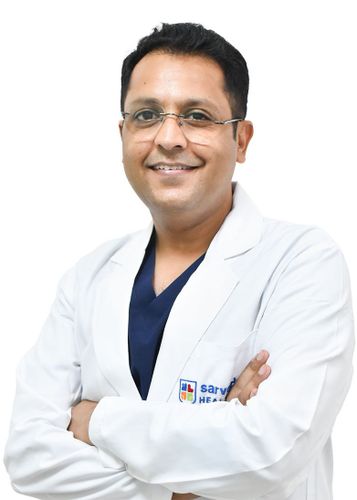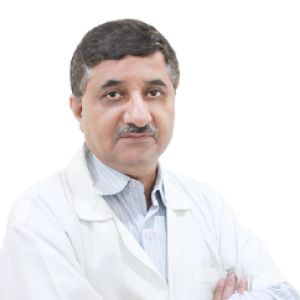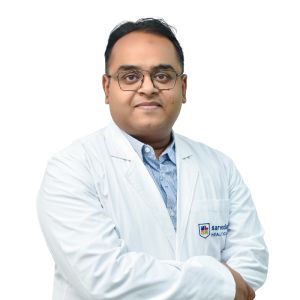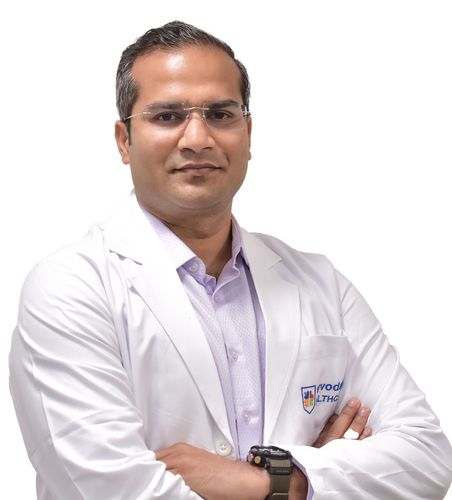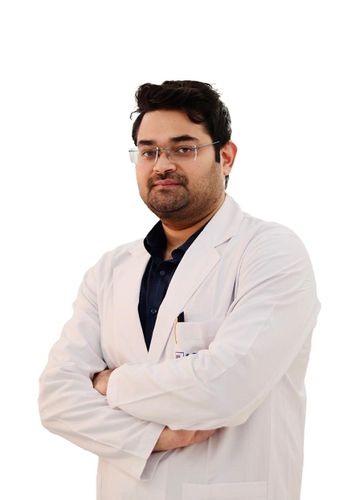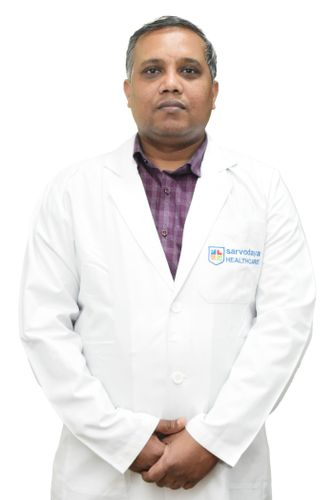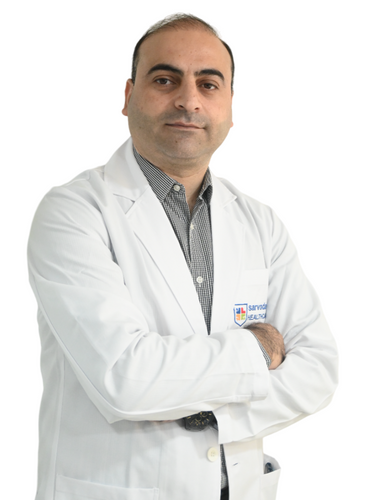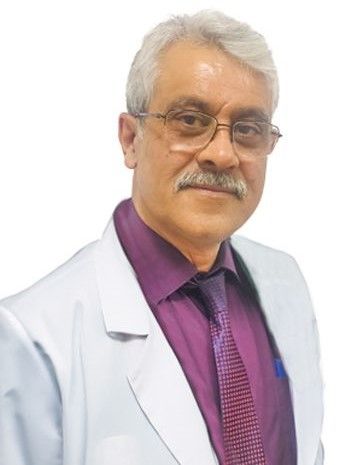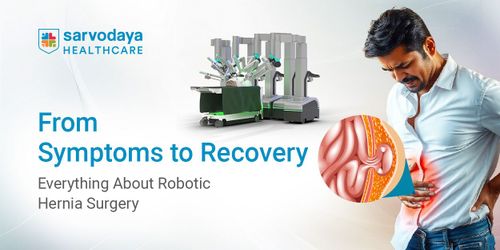Overview
A hernia occurs when a weakness in the abdominal wall allows internal tissue, like fat or part of the intestine, to push through, forming a visible bulge under the skin, often in the abdomen or groin. Sarvodaya Hospital offers minimally invasive hernia surgery for both adults and children, including infants. Our expert surgeons assess your condition thoroughly before recommending the right surgical treatment.We are recognised as one of the best Robotic General Surgery Hospitals in Faridabad for performing robotic surgeries for a wide range of conditions, including hernia. Minimally invasive robotic Hernia Surgery ensures small cuts, less scars, less blood loss, quick recovery and early hospital discharge with optimal results.
Hernia Symptoms
- Visible bulge or lump in the abdomen or groin area
- Bulge becomes more noticeable when standing, coughing, or lifting
- Pain or discomfort at the site of the bulge
- Heavy or dragging sensation in the lower abdomen
- Burning or aching feeling around the hernia site
- Swelling around the testicles (especially in inguinal hernias)
- Nausea or vomiting in severe or strangulated hernias
- Difficulty standing or walking for long periods
Hernia Causes
- Weakness in the abdominal wall
- Chronic coughing or sneezing
- Straining during bowel movements or urination
- Heavy lifting without proper technique
- Obesity or sudden weight gain
- Pregnancy-related abdominal pressure
- Previous abdominal surgery or injury
- Aging
Hernia Diagnosis
Accurate diagnosis is the first step toward effective hernia treatment. At Sarvodaya Hospital, our Best General Surgeon in Delhi NCR uses a combination of clinical assessment and advanced imaging to confirm the condition and plan the best course of action.- Physical Examination: A doctor checks for a visible or palpable bulge, especially when you cough or strain.
- Patient History Evaluation: Understanding symptoms, lifestyle, and past medical conditions helps guide diagnosis.
- Ultrasound: A non-invasive imaging test to detect soft tissue protrusions and assess the hernia's size.
- CT Scan or MRI: These provide detailed cross-sectional images to locate deeper or complex hernias.
- Endoscopy: In certain cases, a thin tube with a camera is used to view internal organs and confirm the diagnosis.
Hernia Treatment
We offer a range of treatment options based on the type and severity of the hernia. With guidance from the Top Laparoscopic Doctor in Delhi NCR, we ensure each patient receives a precise diagnosis with clarity and care.- Conservative Management (Watchful Waiting): In cases of small, asymptomatic hernias, doctors may recommend regular monitoring without immediate surgery.
- Open Hernia Repair Surgery: A traditional method where the surgeon makes an incision to reposition and repair the hernia.
- Laparoscopic Hernia Repair: A minimally invasive approach using small incisions, a camera, and instruments for faster healing and less discomfort.
- Minimally Invasive Robotic Hernia Surgery: Performed with the help of an advanced surgical robot, through one tiny cut, offering faster recovery and better cosmetic outcomes.
- Use of Surgical Mesh: Reinforces the weakened area to reduce recurrence and improve long-term success.
Hernia Prevention & Lifestyle Modification
While not all hernias can be prevented, certain lifestyle changes can reduce your risk and support long-term abdominal health. Here are some helpful habits to adopt:- Maintain a healthy body weight: Extra weight puts pressure on the abdominal wall, increasing hernia risk.
- Avoid heavy lifting: If unavoidable, use proper technique and avoid straining your core.
- Eat a high-fibre diet: This helps prevent constipation and straining during bowel movements.
- Quit smoking: Smoking can lead to chronic cough and weaken connective tissues.
- Exercise regularly: Strengthening core muscles helps protect the abdominal wall.
Pre- & Post-Surgery Lifestyle Modifications
Pre-Surgery Modifications- Stop smoking
- Follow fasting or dietary instructions
- Discontinue medications like blood thinners
- Maintain personal hygiene
Post-Surgery Modifications
- Avoid lifting heavy objects
- Resume light activities gradually
- Follow a fibre-rich diet
- Take prescribed medications on time
- Wear an abdominal support belt
- Attend all follow-up visits


